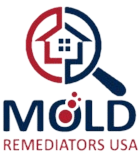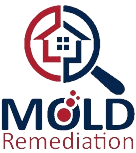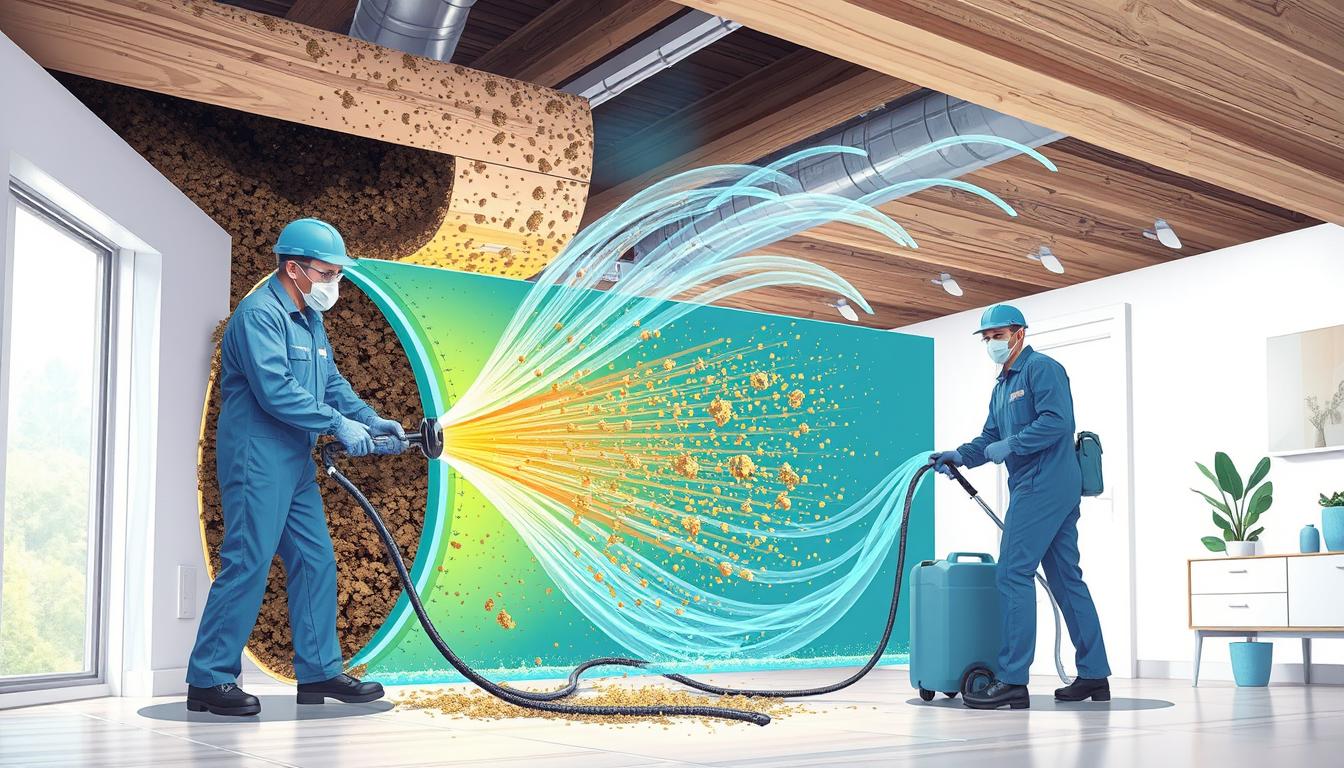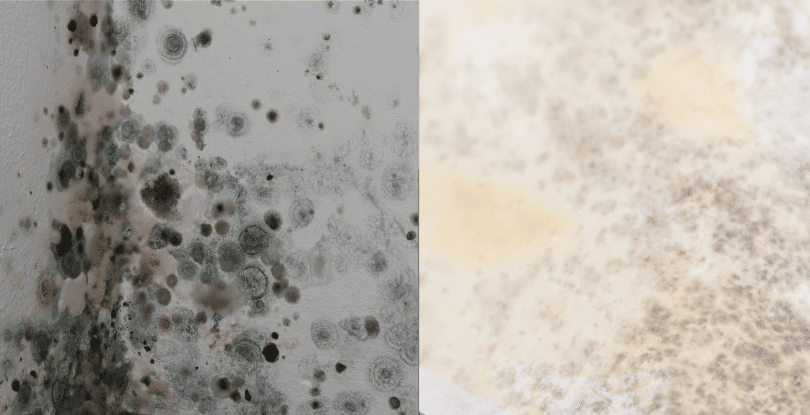Did you know 90% of people spend their time indoors? We take about 25,000 breaths daily. That’s a lot of air we breathe each day! Ensuring clean air in our homes is very important.
Mold air duct cleaning is a key solution for better indoor air quality. It’s a vital step for a healthier home.
I’ve seen how air duct maintenance can change a home’s feel. Experts like Breathe Easy Air Conditioning have shown great results. They’ve been in Northeast Florida for 14 years, helping many homes.
Good air quality is not just about comfort. It’s also about health. The EPA says poor air quality can cause allergies and breathing problems. That’s why cleaning air ducts every 3 to 5 years is recommended.
Professional mold air duct cleaning is a smart choice. It improves air quality and can save energy. Plus, many companies offer free estimates, making it easy to start.
Key Takeaways
- 90% of people spend most of their time indoors
- We breathe about 31 pounds of air daily
- Professional mold air duct cleaning has an 85% success rate
- Air duct cleaning is recommended every 3-5 years
- Clean air ducts can improve health and HVAC efficiency
- Many companies offer free estimates for mold air duct cleaning
Understanding the Importance of Clean Air Ducts
Clean air ducts are key to a healthy home. Indoor air often has pollutants like pet dander and chemicals. These can cause breathing problems if not removed.
That’s why regular mold inspections and cleaning air ducts are vital for a safe home.
The Role of Air Ducts in Home Air Quality
Air ducts move air in your home many times a day. They collect dust, pet dander, and mold. Clean ducts mean less allergens and better air.
For people with allergies or breathing issues, clean air ducts can greatly improve comfort.
Health Risks Associated with Dirty Air Ducts
Dirty air ducts can hold bacteria, mold, and even dead animals. This causes bad smells and health risks. Cleaning your HVAC system is key to avoiding these problems.
It helps keep your living space healthy and safe.
Impact on HVAC System Efficiency
Dirty air ducts hurt your HVAC system’s performance. Debris blocks airflow, making cooling and heating less effective. This means higher energy bills.
Regular cleaning can boost system efficiency by 20%. It saves energy and money, and reduces breakdowns.
| Cleaning Frequency | Residential | Commercial |
|---|---|---|
| Recommended Interval | Every 6 months | Monthly |
| Benefits | Improved air quality, reduced allergens | Healthier environment for employees and customers |
By focusing on air duct and HVAC system cleaning, you’re improving air quality. You’re also investing in your health and home’s efficiency.
Signs Your Air Ducts Need Cleaning
Knowing when to clean your air ducts is vital for a healthy home. Let’s look at some signs that show it’s time for duct cleaning.
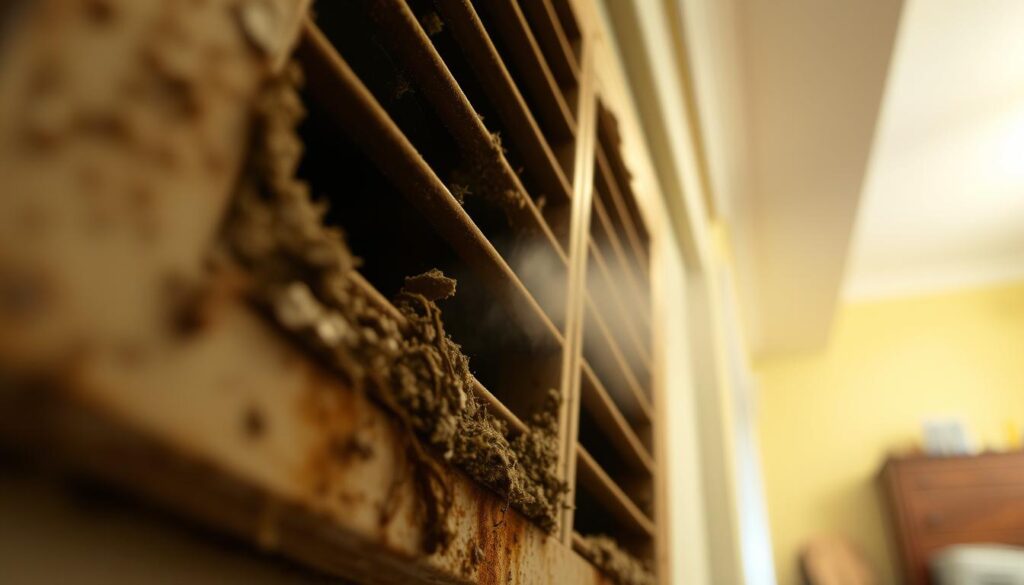
Dust around vents and registers is a clear sign. If you see this, your ducts likely have a lot of dust and debris. Also, if your energy bills suddenly go up, it could mean your ducts are dirty. Dirty ducts make your HVAC system work harder, using more energy.
Health issues are another warning. More allergies or breathing problems in your family might mean it’s time for a mold inspection and duct cleaning. If your HVAC smells bad, it could be a sign of ductwork problems.
- Visible mold on vents
- Dust puffs when the HVAC starts
- Frequent sneezing or coughing indoors
- Strange noises from ductwork
Did you know 90% of homes see better air quality after duct cleaning? Homes with dirty air filters often need duct cleaning. If you see these signs, getting a professional to check and clean is a good idea.
| Sign | Potential Issue | Impact |
|---|---|---|
| Increased energy bills | Obstructed ductwork | 30% spike in heating/cooling costs |
| Mold presence | HVAC system contamination | 60% higher risk of respiratory issues |
| Dust accumulation | Clogged air ducts | 75% reduction in dust levels post-cleaning |
Regular maintenance is crucial. By watching for these signs, you can keep your home’s air quality high and your HVAC system running smoothly.
The Link Between Mold and Air Duct Contamination
Mold in air ducts is a big problem that can hurt your home’s air quality. It’s scary to know that 18% to 50% of homes have mold. This shows how important it is to clean your air ducts regularly to keep your home healthy.
Common Causes of Mold Growth in Air Ducts
Mold loves damp, dark places. Air ducts are perfect for mold because of:
- Moisture from high humidity or leaks
- Poor ventilation that traps moisture
- Dust and debris that mold can eat
Health Implications of Mold Exposure
Being around mold can make you sick. Research shows that 4.6 million out of 21.8 million asthma cases in America are because of mold at home. Even harmless mold can cause problems when it’s in the air. Symptoms include:
- Allergic reactions
- Respiratory issues
- Headaches and feeling tired
Identifying Mold in Your Air Duct System
Finding mold in air ducts can be hard. Watch for these signs:
- Musty smells from vents
- Visible mold around vents or ducts
- More allergies at home
If you think there’s mold, don’t wait. Get professional air quality tests to be sure. Remember, knowing the truth about mold helps fix the problem. Quick action and professional cleaning can make your air much better.
Keeping your HVAC system clean and dry stops mold. By doing this, you’re making your home a healthier place.
Mold Air Duct Cleaning: Professional vs. DIY Approaches
Many people wonder if they should clean their air ducts themselves or hire a pro. Let’s look at both options to help you decide.
DIY air duct cleaning seems appealing because it’s cheap, costing just $20 for tools. You can do it on your own schedule. You’ll need a vacuum, brush, and mask.
But, professional duct cleaners have the skills and tools needed for a deep clean. They use advanced tech and HEPA filters. This ensures all mold is removed, even in hard spots.
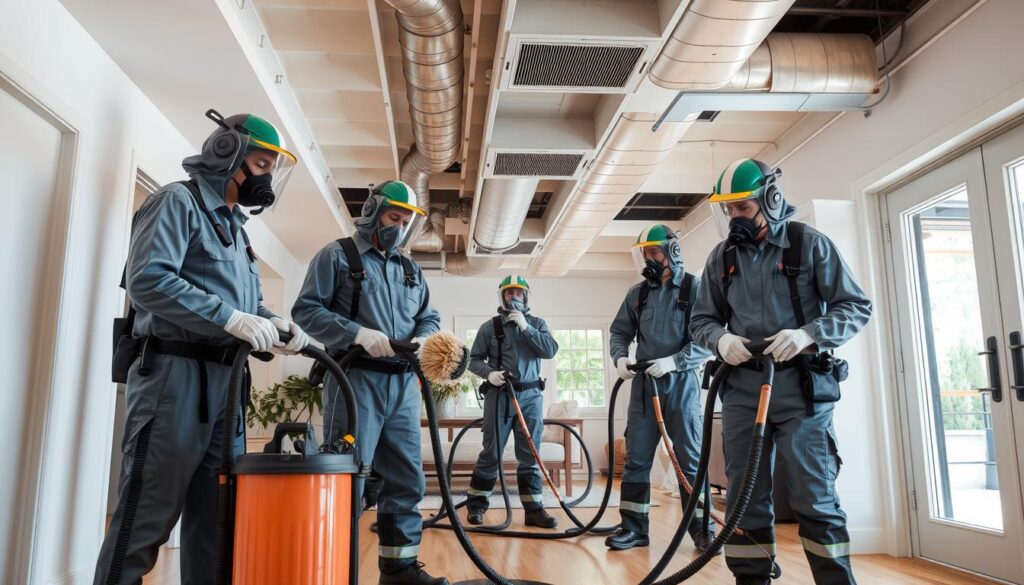
| Aspect | DIY | Professional |
|---|---|---|
| Cost | $20-$50 | $300-$1000 |
| Time | Flexible, but time-consuming | Efficient, usually 1 day |
| Equipment | Basic household tools | Specialized HVAC cleaning equipment |
| Effectiveness | Limited, may miss areas | Thorough, reaches all areas |
| Risk | Potential damage to ducts | Low risk, insured service |
DIY might be cheaper, but hiring pros gives you confidence and better results. Your choice depends on your budget, time, and duct system complexity.
The Professional Mold Air Duct Cleaning Process
Professional air duct mold removal is a detailed process. It makes your home’s air much cleaner. Let’s explore the steps involved in this important service.
Initial Inspection and Assessment
The first step is a thorough check of your ductwork. Technicians use tools like robotic cameras to see how much mold there is. They find the worst spots to plan the cleaning.
Preparation and Containment
Before starting, the area is made ready to stop dust and mold from spreading. Vents are sealed and air pressure is controlled. Duct cleaning services make sure your home stays safe during cleaning.
Cleaning Techniques and Equipment Used
Special tools and methods are used for cleaning:
- Powerful HEPA vacuums
- Rotary brushes for loosening debris
- Pneumatic devices for thorough cleaning
- EPA-approved sanitizers for mold treatment
Post-Cleaning Inspection and Verification
After cleaning, a final check is done to make sure everything is gone. Airflow tests show if the HVAC system works better. This step confirms the cleaning was successful.
| Service Component | Purpose | Benefit |
|---|---|---|
| Initial Inspection | Assess mold extent | Tailored cleaning plan |
| Containment | Prevent spore spread | Protect home environment |
| Specialized Cleaning | Remove mold and debris | Improved air quality |
| Final Verification | Ensure thorough cleaning | Peace of mind for homeowners |
Choosing professional duct cleaning services is a smart move. It improves your home’s air and your family’s health. It’s wise to clean your air ducts every three to five years for the best air quality.
Benefits of Professional Air Duct Mold Removal
I’ve seen how professional mold air duct cleaning changes a home. It offers many benefits. Let’s explore why it’s key for your home.
Improving indoor air quality is the main perk. Removing mold, dust, and allergens makes your air fresher and cleaner. This can reduce respiratory problems and allergies for your family.
Your HVAC system will also benefit. Clean ducts mean better airflow and efficiency. This can lower your energy bills and extend your HVAC’s life.
| Benefit | Impact |
|---|---|
| Improved Air Quality | Reduced allergens, fresher air |
| HVAC Efficiency | Lower energy bills, extended system life |
| Health Benefits | Fewer respiratory issues, reduced allergy symptoms |
| Mold Prevention | Decreased risk of future mold growth |
Professional mold air duct cleaning also stops mold from coming back. It tackles moisture issues and cleans the system well. This stops mold from growing again, saving you money on future clean-ups.
“After professional duct cleaning, I noticed an immediate difference in my home’s air quality. My allergies improved, and the musty smell disappeared.”
Knowing your home’s air is clean and healthy brings peace of mind. Professional air duct mold removal is an investment in your family’s health and your home’s future.
Preventing Future Mold Growth in Air Ducts
Keeping mold out of your HVAC system is very important. Let’s explore some ways to stop mold and clean your HVAC system. This will make your home air cleaner and healthier.
Moisture Control Strategies
Stopping mold starts with controlling moisture. Use a dehumidifier to lower humidity inside. Also, make sure to ventilate places like bathrooms and kitchens well.
Regular Maintenance Tips
Keep your HVAC system in great shape with regular checks. Hire professionals for annual inspections. They’ll clean your system, change filters, and check important parts.
This regular care is key to stopping mold.
Importance of Quality Air Filters
Good air filters are vital for keeping your HVAC system mold-free. Change your AC filters often. This keeps your air clean and stops mold from growing.
| Maintenance Task | Frequency | Benefit |
|---|---|---|
| Air duct cleaning | Every 2-5 years | Removes existing mold, prevents future growth |
| HVAC inspection | Annually | Ensures optimal performance, prevents mold growth |
| Filter replacement | Every 1-3 months | Improves air quality, reduces mold risk |
By following these tips, you’ll make it hard for mold to grow. Your air ducts will stay clean, and your home will stay healthy.
Cost Considerations for Air Duct Mold Remediation
I’ve looked into the costs of cleaning air ducts from mold. It’s key to know the financial side before you hire someone. The prices for removing mold from HVAC systems can change a lot.
The cost to fix mold in homes usually ranges from $1,100 to $3,340. Most people end up paying about $2,220. For just the air ducts, you might spend between $550 and $2,200. If the mold spreads to other parts of your HVAC, the price goes up even more.
Here’s a breakdown of potential costs:
- Basic air duct cleaning: $268 – $492
- HVAC mold removal: $2,500 – $10,000
- Whole-house mold remediation: $11,000 – $25,000
These prices might seem steep, but think about the long-term gains. Professional duct cleaning can make your air cleaner, your HVAC work better, and save you money on health costs. Ignoring mold can cause more damage and cost more later on.
Investing in professional HVAC mold removal is not just about clean air ducts; it’s about protecting your health and home.
The final cost depends on your home’s size, how much mold there is, and your duct system’s complexity. I suggest getting quotes from different duct cleaning services. This way, you can find the best deal for your needs.
Choosing the Right Air Duct Cleaning Service
Finding reliable duct cleaners is key to keeping your air clean. The right choice can greatly improve your air quality and system efficiency.
Certifications and Qualifications to Look For
When looking for duct cleaning services, check for certifications. Look for the National Air Duct Cleaners Association (NADCA) and the Institute of Inspection Cleaning and Restoration Certification (IICRC). These show the company meets industry standards.
Questions to Ask Potential Service Providers
Before you hire, ask about their cleaning process, equipment, and mold experience. Find out if they use negative pressure, as NADCA suggests. Also, ask for before and after photos of their work.
Reading and Interpreting Customer Reviews
Customer reviews are very helpful. Look for companies with lots of positive reviews and high ratings. For example, a company with over 1,500 Google reviews and an average rating of 4+ stars is likely good. Asking for references from past customers is also a good idea.
| Consideration | Why It’s Important |
|---|---|
| Certifications | Ensures adherence to industry standards |
| Cleaning Process | Indicates thoroughness and effectiveness |
| Customer Reviews | Reflects real-world service quality |
| Before/After Photos | Demonstrates actual results |
By thinking about these points, you can choose the best duct cleaners for your home.
The Impact of Clean Air Ducts on Energy Efficiency
Clean air ducts can really help your home use less energy. When I cleaned my ducts, my energy bills went down a lot. The U.S. Environmental Protection Agency says you can save up to 20% by keeping your ducts clean.
Clean ducts let air move better through your HVAC system. This means your system doesn’t have to work as hard. A study by the National Air Duct Cleaners Association found you can save up to 36% by cleaning your HVAC and air ducts.
Here’s how clean air ducts help with energy efficiency:
- Improved airflow reduces strain on HVAC components
- Even distribution of warm or cool air throughout your home
- Reduced energy consumption leads to lower monthly bills
- Extended lifespan of HVAC system due to less wear and tear
Clean air ducts also improve indoor air quality. They remove dust, mold, and other harmful stuff. This makes your home healthier, especially for people with allergies or breathing problems.
“Clean air ducts are essential for optimal HVAC performance and energy efficiency. Regular maintenance can lead to significant savings and a more comfortable home.”
From my experience, getting your air ducts professionally cleaned is a good investment. You’ll save on energy, breathe better air, and maybe even increase your home’s value.
When to Schedule Your Next Air Duct Cleaning
Many people wonder when to get their air ducts cleaned. The answer varies. Experts say you should get duct cleaning every three to five years. But, don’t just set a date and forget about it.
Look out for signs that your ducts need cleaning sooner. If your energy bills suddenly go up, or dust keeps coming back, it’s a sign. Also, if you see black dust or smell bad odors from your vents, it’s time to call for help.
Seasons can also influence when to clean your ducts. Spring is a good time to do it. It helps get rid of winter dust and prepares your home for allergies. Fall is also a good choice, making your home cozy and efficient for winter.
Remember, clean ducts mean better air and a healthier home. So, watch your calendar, but also listen to your home’s needs.
FAQ
Why is air duct cleaning important?
Cleaning your air ducts keeps your home air clean and healthy. It removes dust, allergens, and pollutants. This makes it easier for your family to breathe and live healthier.
What are the signs that my air ducts need cleaning?
Signs include dust around vents and increased allergies. Also, odd smells when the HVAC runs, higher bills without reason, and mold on vents. Sneezing or coughing when the system is on is another sign.
What are the common causes of mold growth in air ducts?
Mold grows due to moisture, poor air flow, and organic matter in ducts.
What are the health implications of mold exposure?
Mold can cause allergic reactions and serious breathing problems.
Is it better to hire a professional or attempt DIY air duct cleaning?
DIY cleaning is possible, but pros have the right tools and know-how. They clean better, reaching all parts of the duct system.
What are the benefits of professional air duct mold removal?
Pros improve air quality, reduce allergens, and boost HVAC efficiency. This helps with breathing, cuts down on asthma attacks, and saves money in the long run.
How can I prevent future mold growth in my air ducts?
Control moisture, maintain your system, and use good air filters. Fix leaks, ensure good air flow, change filters, and check your HVAC regularly. Be careful of dust-causing activities.
How much does air duct mold remediation cost?
Costs vary by home size, mold extent, and duct system complexity. While it may seem expensive, it saves money on energy and health costs over time.
What should I look for when choosing an air duct cleaning service?
Look for NADCA certifications, ask about their methods and equipment, and check reviews. Make sure they’re transparent about prices and answer your questions.
How does clean air ducts impact energy efficiency?
Clean ducts make your HVAC system work less hard. This lowers energy use and bills. Clean ducts also improve airflow and may extend your HVAC’s life.
How often should I schedule air duct cleaning?
NADCA suggests every 3 to 5 years. But, more often if you have pets, smokers, allergies, or have recently moved or renovated.
